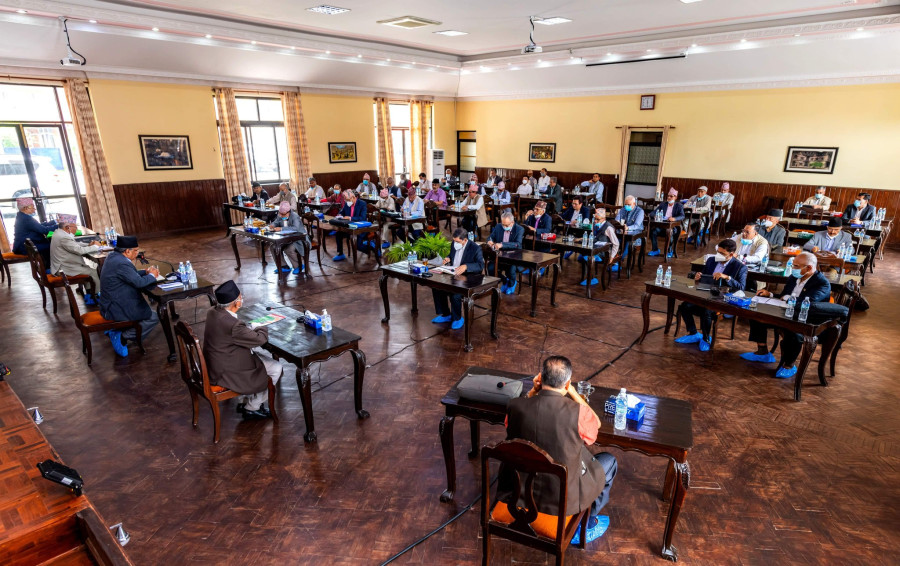Politics
Ruling party’s Standing Committee meeting postponed for a week
With Dahal already on the backfoot, Oli’s resignation won’t be an agenda anymore even if the meeting is held next week, insiders say.
Post Report
After a hiatus of three weeks, the ruling Nepal Communist Party’s Standing Committee meeting was held on Tuesday at Baluwatar, but it concluded within half an hour, with the decision to direct the party’s rank and file to be involved in rescue and relief in the wake of floods and landslides across the country.
“There was only one agenda for today to direct the party members to respond to natural disasters,” said Narayan Kaji Shrestha, party’s spokesperson. “The meeting also expressed condolences to the families of those who lost their lives to floods and landslides and wished speedy recovery of the injured.”
At the meeting, a proposal to direct the party members to involve in rescue and relief was tabled, as 233 people have been killed, 98 have disappeared and 99 have been due to the floods and landslides, according to Shrestha.
According to Shrerstha, the next Standing Committee meeting has been scheduled for July 28.
The last time the Standing Committee was held was on July 2 after it first sat on June 24.
At that time, the Pushpa Kamal Dahal faction, backed by senior leaders Madhav Kumar Nepal and Jhalanath Khanal, was putting pressure on KP Sharma Oli to resign both as party chair and prime minister.
As many as 30 Standing Committee members had raised the issue of Oli’s resignation for his failure to ensure governance even during the pandemic and run the party.
Until then, it looked like the Dahal faction would not backtrack on its stance.
Oli on July 2 suddenly prorogued the House session, signalling that he could even split the party if the rival faction continued to pile pressure on him to step down. Two days later, Oli called all his ministers to Baluwatar and told them that the Dahal faction was trying to oust him and impeach the President.
Since then Oli and Dahal held a series of meetings, some between them only without the presence of second-rung leaders, but both failed to find a common ground.
Leaders say there were concerns that increasing polarisation could lead to a party split.
Pressure then started piling on the leadership to not take any extreme measure which could result in the party’s implosion.
In one of the meetings between Oli and Dahal, senior leader Nepal too was invited on July 16 where they reached a tentative understanding on calling the Central Committee.
The same day, the Dahal faction held a meeting at Khumalatar and decided that they should press for calling the Central Committee meeting by the third week of August. Oli too held discussions with leaders loyal to him the same evening at Baluwatar.
The Oli faction was quick to sense that the Central Committee could prove to be a threat, as the Dahal-Nepal faction held a comfortable majority.
Oli then at Saturday’s Secretariat meeting proposed an early general convention with the promise that he would back Dahal for sole party chair.
Dahal did not raise the issue of Oli’s resignation.
After the meeting at Baluwatar, both Oli and Dahal met with President Bidya Devi Bhandari, raising suspicion among leaders of the Nepal and Khanal factions.
The Nepal faction a day later demanded an answer from Dahal whether he had reached a deal on the general convention by November/December.
Dahal on Monday admitted before some Standing Committee members that Oli had proposed the general convention with the promise to back him for the party chair but with a precondition that he has to embrace People’s Multi-Party Democracy as the party’s ideology.
“That was a surprising proposal from Oli,” a Standing Committee member quoted Dahal as saying on Monday.
Insiders say Dahal now is telling leaders close to him that there is no alternative to reconcile with Oli and move forward.
Dahal now is caught between a rock and hard place, according to a leader.
If Dahal chooses to side with Oli, he will alienate Nepal and Khanal on whom he invested so much time and energy to forge an alliance that at one point of time had become so strong that they could have ousted Oli. If he continues the alliance with Nepal and Khanal, he has to reconcile with Oli, as the latter has emerged strong, say insiders.
Oli’s resignation issue is not an agenda now so there is not much to expect from the Standing Committee meeting next week, according to them.
ENDS




 24.74°C Kathmandu
24.74°C Kathmandu













